Local News
The Story Behind the Greatest Chuck Berry Bootleg You May Never Hear
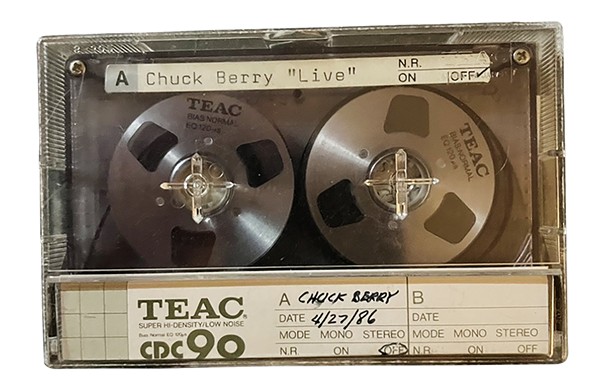
Thirty-eight years ago, the man who more than anyone else invented rock & roll left it all on a stage in Austin, Texas.
It was April 27, 1986, and Chuck Berry, then 59, was on the final night of a tour that had him headlining a bill of legacy acts that included Chubby Checker, Martha and the Vandellas, the Shirelles and others.
In this era, when Berry was on the road, his typical backing band consisted of “whatever underpaid local rockers the promoter rounded up,” as one biographer put it.
But that night in Austin, Berry was backed by Bo Diddley’s famed bassist Debby Hastings. On drums was St. Louis native Mike Mesey, now 66, who played with Berry everywhere around their shared hometown, from Busch Stadium to Blueberry Hill.
Mesey recalls the Austin crowd being “on fire,” and that instantly galvanized Berry. “It was a perfect storm. He was in the perfect mood. The crowd just set him off right. He looked back at me, smiled and kicked it in,” Mesey says.
Berry opened with “Roll Over Beethoven” and went right into “School Days.”
“It was like a freight train from song one,” Mesey says. By the end of the 14-song set, Berry was ad-libbing lyrics along with his guitar riffs.
“I love you!” he shouted to the crowd during “Johnny B. Goode,” the show’s penultimate number. “You’re all my rock children!”
The real gem of the night was the closer, a version of “Reelin’ and Rockin'” that went on for more than twelve minutes (the studio version runs about three minutes). The horn section from one of the night’s previous acts came up and started jamming. The brass players riffed over Berry’s guitar licks. Audience members got on stage and started dancing.
The technician working the mixing board that night recorded the show. He handed the tape over to the promoter who, about a month later, gave it to Mesey.
“I always say to myself, I think it’s like the greatest rock live version caught on tape of Chuck,” says Mesey.
And now, Mesey is determined to bring that show in Austin to Berry fans across the world — a quest for which he’s spared little effort or expense.
There’s just one problem.
Without the blessing of either Universal Music Group, which owns most of Berry’s recordings, or the Berry estate, it is unclear if Mesey has the right to release the bootleg he’s spent two years toiling over.
click to enlarge COURTESY OF MIKE MESEY Chuck Berry, left, with Mike Mesey. The two frequently played together during Berry’s St. Louis shows.
Mesey says that between 1986 and 2021, he occasionally retrieved the tape from his home safe to play it for others. Those impromptu audiences were always blown away.
During those decades Mesey enjoyed a robust touring and studio career working with bands such as REO Speedwagon and Head East. Then, at the end of 2021, with COVID causing a lull in Mesey’s schedule, he decided he wanted to do something with the Berry tape.
“I got to thinking, instead of calling somebody and saying, ‘Hey, I want to do this and I want to do that,’ I thought to myself, just get it all completed and get it perfect, then go to everybody and say, ‘It’s finished,'” Mesey says.
It’s a strategy that has yielded an immaculate recording … but one that few people may ever hear.
It took two years and Mesey spending, in his calculation, “six figures” out of his own pocket to bring the bootleg tape’s technical quality up to par with the performance it captures.
The live recording of the show was all captured on one single track on a shoddy cassette. The tempo of the recording started speeding up in places; the keys changed. All that had to be corrected. Working at first in St. Louis and then later at Abbey Road in London, Mesey was able to separate the vocals, guitar, bass and drums into three individual tracks. He then gave the product what he calls a more modern rock mix.
“Rock & roll lovers around the world will just get a blast out of hearing that,” Mesey says.
He has a point. Mesey made several clips of the would-be live album available to the RFT, and his work has clearly paid off. The treble of Berry’s guitar sounds as good as ever and, especially when listening with headphones, the rhythm section is absolutely ripping along behind it. The remixed recording is the embodiment of a whole being greater than the sum of its parts.
“Nobody knows it’s here,” Mesey says. “Nobody knows how good it is.”
Mesey titled the would-be live album Chuck Rocks Live: All My Rock Children and even designed cover art.
But after that, things got tricky, and Mesey needed an engineer of a different sort. He got in touch with Al Watkins, a St. Louis-based attorney with a knack for showing up anywhere that personality, controversy and the legal system collide.
“The thought process here was, ‘How do we get this music out there so it can’t not be heard?'” Watkins says. “Every now and then, the double negative is worthwhile.”
click to enlarge ZACHARY LINHARES Mike Mesey with the cassette case for the project he’s devoted countless hours to.
The majority of Berry’s catalog is owned by Universal Music Group, including most of his signature songs he originally recorded in the 1950s for what was then the Chicago-based Chess Records, which form the core of the April 1986 setlist. And that presents some big problems for someone with a bootleg of his music — even if that person himself is playing on the recording.
“He can release anything he wants,” says Michael Nepple, an attorney with Thompson Coburn with expertise in intellectual property law. “The risk is getting nailed on copyright infringement.”
Nepple stresses he isn’t familiar with the specifics of All My Rock Children. But after learning of the project in broad strokes, Nepple says, “The drummer is going to have a lot of problems if this goes out.”
And the damages could be staggering. Speaking generally, Nepple says individuals whose copyright has been infringed upon can sue for multiple types of damages. One type of legal action would be to recoup any money that someone made off another person’s intellectual property, what is called suing for actual damages.
Then there are statutory damages, which, according to Nepple, can run up to $150,000 per infringing work.
“So if Chuck Berry ripped out 15 songs, the guy could be on the hook for either actual damages or $150,000 times 15,” Nepple says.
For the past year, Mesey and Watkins have been working to get the bootleg album released. Watkins says that they approached Universal Music Group about the project and were told, essentially, thanks but no thanks.
One lever might be to get the Berry family on board. How could Universal sue if the Berrys were excited by the project — or even stood to benefit from it?
The exact arrangement, if any exists, between the Berry estate and Universal Music Group is not known. But Nepple says it is not unusual for the estate of legacy artists to have struck a deal with entities like Universal wherein the family can give input on what sort of uses the songs can be put to.
But when it comes to getting the blessing of the Berry family, Watkins says it’s unclear who the decision-maker for the Berry estate is.
“They heard the clips and they loved it,” Mesey says of the family. “They just couldn’t move. I don’t know all the details. But, basically, they just didn’t come back with any kind of [being] able to move forward.”
Gary Pierson, an attorney at Capes Sokol, says he represents Berry’s family and “the entity that controls all rights with respect to his music, likeness and all other intellectual property.” Pierson says the family has declined comment. However, that silence is a response in and of itself.
Berry’s career is replete with his work being pilfered by others. Perhaps most famously, in 1963 the Beach Boys wrote new lyrics to Berry’s song “Sweet Little Sixteen” and had a mega-hit with “Surfin’ U.S.A.” (Berry biographer RJ Smith wrote that Berry likely heard the pilfered smash hit while in prison in Jefferson City. He was later credited as the song’s writer.)
click to enlarge ZACHARY LINHARES Paul Berry III is Chuck Berry’s great-nephew — and a candidate for lieutenant governor of Missouri.
As for others making money off his music, “He didn’t tolerate that at all,” says Wayne Schoeneberg, Berry’s longtime attorney in St. Charles (Schoeneberg is not involved with the estate). “He was very protective of his own intellectual property.”
For 20 years, Schoeneberg helped Berry handle issues related to the rights and the licensing of his music. Schoeneberg says Berry had a good business sense, though at times he would turn down deals, even lucrative ones, if they didn’t feel right.
“He was just a unique individual and had his own way of addressing everything,” Schoeneberg says. “He and I would frequently disagree on approaches, but he was the boss.”
Paul Berry III is the rock & roll star’s great-nephew and also happens to be running for lieutenant governor. He makes clear that he does not represent the Berry estate, but, speaking directly to this issue, says he is alarmed — in more ways than one — by the idea that someone would spend at least $100,000 of their own money and travel to London to work on a record without getting approval from either of the two entities that own the underlying music.
“From what is being explained, I would really be concerned about whether he may have mental health issues,” Berry III says. “I would definitely want to pray for his health in that regard.”
He adds, “It’s a shame the godfather of rock & roll can’t rest in peace without people pillaging his grave.”
click to enlarge ZACHARY LINHARES Mike Mesey, left, and Sam Maul at Shock City Studios in St. Louis. The two worked for months pulling out and cleaning up the Berry tape.
Mesey is hardly the first creative person, musician or otherwise, to spend two years and $100,000 on a project that is hardly a sure thing — only to be called crazy.
And for the record, he says the effort wasn’t always as quixotic as it appears now. He doesn’t want to go into details, but says that for a while he and attorney Watkins were working with an intermediary to the Berry family, until, for reasons that remain opaque, things “hit a wall.”
Mesey is taking it all in stride. Despite the album not even being out in the world, he still says it’s one of the most special things he’s ever done.
The reason he’s talking to the RFT and sharing clips of the work is that he’s hoping that once people get a taste of it, they’ll clamor for more. And if that happens, maybe Berry fans from around the world can will the album into existence.
“I didn’t go into this to do anything else other than to honor Chuck Berry,” he says. “The world needs to hear this. This is a tape like no other ever recorded.”
Subscribe to Riverfront Times newsletters.Follow us: Apple News | Google News | NewsBreak | Reddit | Instagram | Facebook | Twitter | Or sign up for our RSS Feed
Local News
80+ Protestors Arrested at Wash U as Students Protest Ties to Boeing
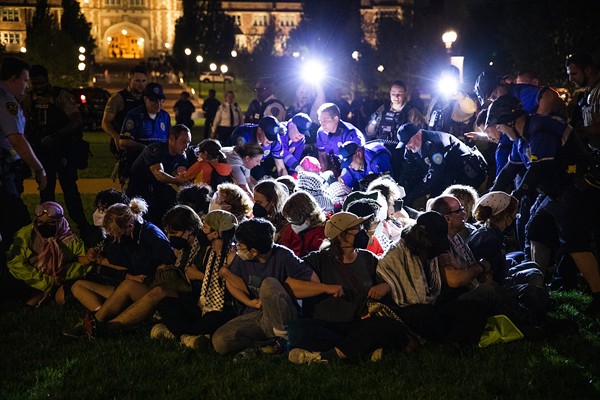
The arrests came in waves, and as students at Washington University chanted for a free Palestine, others were marched away to the beat of a protest drum in the background.
Police from multiple St. Louis-area departments — including Richmond Heights Police, the St. Louis Metropolitan Police Department, the St. Louis County Police and the Washington University Police — spent hours staring down student activists praying, eating and protesting for Palestine on Wash U’s lawn.
Nearly three hours after an initial warning to disperse, officers moved in with zip ties, dragging students to the ground and ripping apart a human chain as they arrested demonstrators.
A protest medic was picked up and slammed to the ground by multiple police officers, a woman wearing a Keffiyeh was ripped from the circle of protesters and slammed down with a hooked arm around her throat by an officer, an older man with gray hair was forced face down into the ground as officers leaned onto him and zip-tied his hands, and other protesters were picked up and carried away to waiting vans. click to enlarge ZACHARY LINHARES Police arrest a pro-Palestine protestor on Saturday, April 27, 2024, at Washington University.
More than 300 Pro-Palestine protesters began a march to Washington University’s campus at 3 p.m. Saturday. Their plan was to set up an encampment upon arrival and hold the line as long as possible. By 8:50 p.m., more than 80 people had been arrested — including Dr. Jill Stein, the Green Party presidential candidate.
In an email to students and staff, Wash U said, “It quickly became clear through the words and actions of this group that they did not have good intentions on our campus. We also felt strongly that this demonstration had the potential to get out of control and become dangerous. When the group began to set up a camp on the east end of campus in violation of university policy, we made the decision to tell everyone present that they needed to leave. Any individuals who refused to leave after being asked multiple times were arrested.”
The university said in the email that arrests were still being processed. “All will face charges of trespassing and some may also be charged with resisting arrest and assault, including for injuries to police officers. We are taking this matter very seriously. For those who are students, we also have initiated the university student conduct process.” click to enlarge ZACHARY LINHARES A protestor is arrested by police on Saturday, April 27, 2024, at Washington University.
The protesters are part of a movement calling for Wash U to divest from Boeing, which they say is supporting genocide in Gaza and supplying Israel with weapons. Protests on campus have been happening for weeks. At one demonstration on April 13 three students were suspended and 12 people were issued court summons.
“Israel’s genocidal campaign has fueled the murder of over 40,000 Palestinians in Gaza in the last 6 months,” Resist Wash U, one of the main organizers of the protest, said in a statement with a list of demands for the university. “The same bombs Israel is dropping on Gaza are manufactured at a Boeing facility in St. Charles, Missouri. Meanwhile, Wash U continues to cultivate its longstanding partnership with Boeing.”
Penelope T. a sophomore at Wash U who declined to give her last name, was one of the organizers for the protest. She says protesters say Wash U must meet a list of demands before the protests will stop, including divesting from Boeing and dropping the charges against other student protesters.
“It’s very clear how horrendous all that’s happening, all that Israel is committing,” she says. “The IDF (Israel Defense Forces) is continuing to slaughter people.” click to enlarge ZACHARY LINHARES Demonstrators lock arms in front of a temporary encampment on Saturday, April 27, 2024, at Washington University.
Shortly after protestors set up the encampment on campus, police arrived and gave an order to disperse, declaring the assembly unlawful. Activists then moved the encampment across from the Kemper Art Museum. Police gave another order to disperse and stared down protesters for hours before making their move.
In addition to the Green Party’s Stein, protesters were joined by St. Louis Aldermanic President Megan Green and Ward 7 Alderwoman Alisha Sonnier. These three walked to the police line and asked to meet with Wash U’s administration to de-escalate the situation before arrests were made. They were forced back by police and administrators refused to cross the line to speak with them.
“We are here to support the students who are standing up for our highest American values, for our democracy, for an end to this genocide which is unacceptable and a blight on this nation,” Stein told RFT. “It must be stopped, the American people want it stopped.
Stein was later arrested by police in one of the first waves. Sonnier yelled at police, begging them to stop laughing as they continued to break up the demonstration, and an officer with a megaphone threatened to arrest Green if she did not leave.
“I will leave once all my students are booked and I know where they are going so I can get them out of jail,” Green told the officer with the megaphone.
“It’s definitely time for y’all [Wash U] to pay taxes,” Sonnier added.
“I’ve been to a lot of protests over my lifetime,” Green said in a post to X (formerly Twitter) after the protest was broken up. “This was one of the most excessive uses of force I’ve ever seen. Six police departments responded to students chanting because they want the genocide in Gaza to stop and the university to divest from those supporting war.”
A common statement activists echoed during the demonstration was that “there are no more universities left in Gaza.” As university students, the protestors say they want to send a message to Wash U that supporting the ongoing attacks, and even remaining silent, is unacceptable.
“There is nothing left in Gaza. Who is going to rebuild it?” Sara Bannoura, a leader with the St. Louis Palestine Solidarity Committee, says. “We are here because the war is still happening. We are here to remind people that St. Louis stands for peace.”
Protestors intended for the encampment to stand for days, or until Wash U met their demands. There was a makeshift food tent, a medical tent and a tent for relieving yourself (complete with cat litter). Protesters instead were forced off campus just before 9 p.m.
After six or seven waves of arrests, police formed a wall and pushed members of the media and the remaining elected officials off campus and back onto the public sidewalk near Skinker.
Protestors say they plan to keep coming back.
Subscribe to Riverfront Times newsletters.Follow us: Apple News | Google News | NewsBreak | Reddit | Instagram | Facebook | Twitter | Or sign up for our RSS Feed
Local News
Student Protests Have Wash U in the Hot Seat Over Its Ties to Boeing
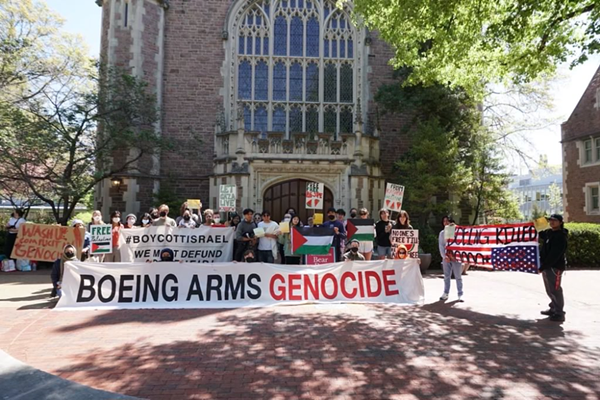
On April 13, activists blended in with a crowd of nearly 500 parents and prospective Washington University students as they entered Graham Chapel for Admitted Students Day. Partway through the event, they made their move.
Three students unfurled a banner, while 17 others marched to the stage while chanting for a free Palestine. Less than 30 minutes later armed police stormed in with zip ties.
Activists were given three warnings to disperse. Then the arrests began. Twelve people were arrested. Three students were suspended.
Nearly two weeks later, two Wash U students sit around a kitchen table in University City to talk about genocide.
The table is covered in political science and abolitionist texts and both students’ phones alert them consistently throughout the conversation. They have already spent a busy morning fielding texts from other organizers working to pressure the school to divest from Boeing and the work to organize future protests is in constant motion.
It is evident during the conversation that the protests are highly organized — with designated de-escalators, designated observers and photographers, and a clear distinction between who could risk arrest and who must be protected at all costs.
Daniel Cazares, a senior studying business and computer science, is one of three students who was suspended, and one of 12 activists slapped with court summons, for protesting inside the chapel.
He and Sonal Churiwal, a sophomore studying women, gender, and sexuality studies and political science, are both involved with Resist Wash U, an activist organization calling on the university to divest from Boeing amid Israel’s brutal attacks on Palestine.
Cazares tells RFT activists disrupted the event for admitted students because it is one of the final times the school has the opportunity to sell itself to potential students. Demonstrators wanted to make it clear to the prospective students and their parents that the school has close ties with Boeing.
While some parents and prospective students attending the event were adamantly opposed to the protest, others — particularly families of color — were sympathetic or spoke with protesters to learn more. “A few families actually stay behind in the chapel for at least 30-40 minutes with us, either throwing peace signs or chanting with us,” Cazares says.This helped give protesters courage because as the chanting continued, armed police entered the chapel, he says.
Rather than being taken to jail, the arrested protesters were issued court summons. Cazares believes that’s because the administration didn’t want photos of students being escorted in public view in handcuffs. (It’s also worth noting that what they were cited with — disturbing the peace and trespassing, municipal ordinance violations for unincorporated St. Louis County — are often handled without people being booked into jail.)
Churiwal remained outside with other students, alumni and activists to hold the line until all arrested protesters were released. They remained there for about two and a half hours, she says.
The arrested activists must now appear in St. Louis County’s municipal court in Hazelwood on June 4.
Cazares also received an email later that day saying he was suspended and banned from campus until the disciplinary process plays out. He wasn’t surprised. In November he’d received a warning, one complete with vague surveillance footage that administrators claim showed him hanging up Pro-Palestine posters on campus. Luckily Cazares was taking the semester off from classes and the suspension won’t impact his graduation date, he says.
One week later, on April 20, Churiwal says she was part of a group that organized a rally on campus. This time, it was the university’s alumni weekend.
Alumni, including a graduate student at Columbia who had been arrested at an encampment there, helped set up a Pro-Palestine encampment on the campus.
“We were making banners and we had food, and within minutes, the Washington University Police Department came over and they had a megaphone and they declared the encampment unlawful, gave us five minutes to leave, and said if we don’t leave, we’re gonna be arrested for trespassing,” Churiwal says.
Multiple departments responded — including the Wash U campus police, the St. Louis Metropolitan Police Department, Richmond Heights Police and Clayton Police — surrounding the encampment with over half a dozen squad cars. At this point the police outnumbered students and alumni.
“To our knowledge we were not breaking any university policy,” Churiwal says.
After some back and forth with protesters, activists were told they were violating the campus’ space utilization policy. Churiwal says they asked what part of the policy was being violated but received no response.
“We were forced to leave and students were walked off campus if we didn’t leave,” she says. “It was clearly an intimidation tactic. […] The university is definitely on edge and definitely wants to shut things down before it has a chance to escalate.”
Wash U students are among the ranks of university students across the U.S. protesting the ongoing onslaught of Gaza and calling on their respective administrations to divest from companies like Boeing.
Wash U’s involvement with Boeing includes an accelerated leadership program, funding for scholarships and tuition discounts for Boeing employees. Boeing is one of the largest employers of Wash U graduates, she says.
In addition to taking direct action, Churiwal worked with Wash U’s student union to formally demand the university divest from Boeing and end those programs.
“Admin hasn’t even felt it necessary to communicate with us on it,” she says. “So if the institution is frustrated by direct action responses, we have also gone through the proper channels for advocacy, and receive absolutely no response.”
Faculty and staff have also expressed disappointment in the university’s attempts to suppress student protests and published a letter on Friday demanding the administration stop calling in armed police and reverse the student suspensions.
RFT asked Wash U by email whether police would be called to future protests, what the university’s response was to claims that these demonstrations have been treated differently than others in the past, and what comment the university had in response to calls to divest from Boeing.
Assistant Vice Chancellor for News & Media Relations Susan Killenberg McGinn emailed the following response: “We fully support free expression and will allow demonstrations that follow our policies. Our policy on Demonstrations and Disruptions is available here. Our policies apply to all demonstrations, regardless of the topic.”
While free speech issues on campus are receiving wide-spread media attention right now as police continue to arrest peaceful protestors from Columbia to the University of Texas, activists hope to keep the conversation centered around Palestine.
“St. Charles’ Boeing factory is the final stop where these planes, bombs, missiles go before getting shipped off to Israel,” Cazares says. “Not even the university but just by being in the city we are so tied to Boeing, and therefore also tied to the genocide that’s going on. So tied to these 40,000+ lives that have just been decimated and erased. It’s heartbreaking every day to be made complicit to that.”
Churiwal says one of the arguments student organizers have heard from the administration is that they shouldn’t be so concerned about Palestine because it is thousands of miles away.
“You all have PhDs, do you not see that the genocide is manifesting abroad but you are manufacturing it here?” she asks. “The genocide is happening in our backyard.”
Cazares adds that the protests have revealed the true attitudes of Wash U administrators.
“The real Wash U is a university that will not hesitate to send armed officers to physically police students, to put their hands on Black and brown student bodies,” he says.
Subscribe to Riverfront Times newsletters.Follow us: Apple News | Google News | NewsBreak | Reddit | Instagram | Facebook | Twitter | Or sign up for our RSS Feed
Local News
Accused Cop Killer Suffered Serious Abuse, Expert Tells Jury
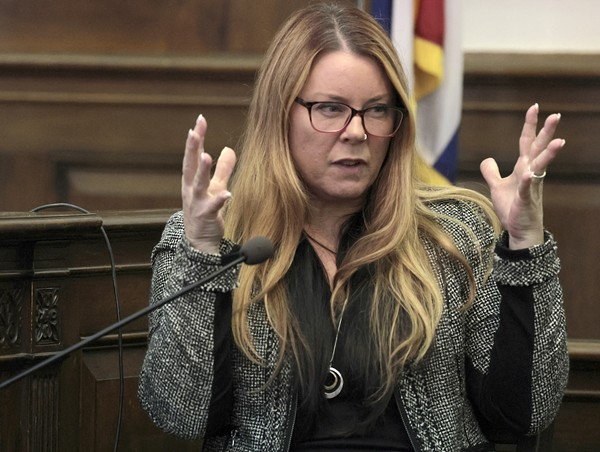
An accused cop killer currently on trial in St. Louis endured years of childhood abuse at the hands of both parents, an upbringing that a forensic psychologist says ultimately led to the August 2020 psychotic episode in which Thomas Kinworthy killed St. Louis police officer Tamarris Bohannon.
The prosecution and defense agree on the basic facts of the case. On August 29, 2020, Kinworthy was armed when he ran into a house on Hartford Street in Tower Grove South. The home’s two residents fled out the back door and called the police. Bohannon, a St. Louis Metropolitan Police Department officer, responded to the scene, where Kinworthy opened fire on him and killed him as he approached the front door. After a 12-hour standoff, Kinworthy was taken into custody and charged with murder.
Kinworthy’s attorneys are pursuing a not guilty by reason of insanity defense, arguing that Kinworthy couldn’t understand what he was doing was wrong when he killed the 29-year-old father of three.
That strategy depends in large part on the testimony of forensic psychologist Patricia Zapf, who first took the stand yesterday and said that Kinworthy meets the standard for being not guilty by reason of insanity.
She testified today that she’d reached this conclusion because Kinworthy was in an “acute psychotic episode” and “disconnected from reality” on August 29, 2020.
Zapf testified she has extensively interviewed Kinworthy, his father, ex-wife and others. The picture those interviews painted of Kinworthy’s life leading up to the killing of Bohannon is grim, including a history of extensive mental, physical and sexual abuse perpetrated by both parents.
Kinworthy was directly molested by his mother, Zapf said, and as a child was made by both parents to perform sexual acts on other adults at various times in his adolescence. She added that Kinworthy’s parents were both very involved in drug culture, with both mom and dad using crack cocaine.
At one point, his parents split, with his mother moving to Florida and Kinworthy staying in St. Louis with his father.
His father beat him and “verbally degraded him,” Zapf said, saying that even when she interviewed Kinworthy’s dad, he told Zapf his son never did anything right.
click to enlarge POOL PHOTO / ST. LOUIS POST-DISPATCH Forensic psychologist Patricia Zapf testified in court today that Thomas Kinworthy suffered years of sexual abuse from both parents and has heard voices since he was a pre-teen.
Zapf also said that at one point, as the pre-teen Kinworthy was living with his father here, his mother kidnapped him and took him to Florida.
In Florida, Kinworthy’s life was even worse than in St. Louis. Life with his mother was “unstable and impoverished,” and she trained him to steal things from stores. There was significant sexual abuse in Florida, Zapf said, with his mother forcing him to have sex with various adults.
It was around this time, in Kinworthy’s pre-teen years, that he began hearing voices and lighting fires, said Zapf.
Around the age of 14, Kinworthy came back to live with his father in St. Louis, where he stayed in a flop house, smoked crack with his dad and was again subject sexual abuse by people passing through to buy and sell drugs.
Zapf testified that there was a history of mental ailments on both sides of Kinworthy’s family and that the severe stressors added throughout years of abuse would have exacerbated his underlying disposition to mental illness. In her opening statement on Monday, Kinworthy’s attorney said that he has been diagnosed with schizoaffective disorder and has heard voices much of his adult life.
As an adult, Zapf said, Kinworthy would slip into manic states, not sleeping for days and having indiscriminate sexual encounters with numerous partners.
In 2006, Kinworthy’s dad was charged federally as part of a conspiracy to distribute methamphetamine. He was initially sentenced to almost 20 years, but was released early, according to court records.
Five days before he would kill Officer Bohannon, in August 2020, Kinworthy, then 43, came to St. Louis to reconnect with his father. Over the next several days, Kinworthy met with dad for about an hour a day. His dad later told Zapf he “recognized something was off” about his son but didn’t confront his son about his unusual behavior.
On the day of the shooting, Zapf said Kinworthy was in a “sexual frenzy state,” had a sexual encounter with a man near Tower Grove Park, and then Facetimed his ex-wife from the park. During that call, he was hiding behind a tree, “white as a ghost” and professing that he believed people were out to get him.
Kinworthy would soon call his ex-wife back after he was barricaded in the Hartford house after killing Bohannon. Zapf testified that the ex-wife found the conversation largely incoherent, but understood Kinworthy to be saying goodbye.
Prosecutor Mary Pat Carl only had about half an hour to question Zapf today before proceedings were called to a halt for the weekend break. However, even in that relatively brief period, the jury got a sense of what the prosecution’s strategy is likely to be regarding Zapf’s expertise.
Carl called to the jury’s attention that Zapf had billed $27,000 to Kinworthy’s defense for her time working for them.
Carl also argued that the process by which Zapf wrote her report about Kinworthy was in contradiction to the process Zapf laid out as a best practice in her own book, specifically that an expert compiling a report on a defendant’s state of mind should have “all the information” before telling the defense what conclusions that report will contain. Carl implied that Zapf had already decided on the basic conclusions of the report before she conducted several “collateral” interviews of Kinworthy’s family members.
Right before the end of today’s proceedings, Carl alluded to jailhouse phone calls during which Kinworthy’s ex-wife and Kinworthy encouraged their child to Facetime Kinworthy’s father.
“Wouldn’t it be good to know whether or not the man they are claiming did horrible abuse and traumatized the defendant is someone they’re also encouraging their daughter to have a relationship with?” Carl asked Zapf. “That wouldn’t weigh in on their credibility at all?”
Zapf said she wasn’t aware of the jailhouse calls.
Kinworthy’s trial is set to resume Monday morning with Carl’s continued questioning of Zapf.
Subscribe to Riverfront Times newsletters.Follow us: Apple News | Google News | NewsBreak | Reddit | Instagram | Facebook | Twitter | Or sign up for our RSS Feed
-

 Entertainment1 year ago
Entertainment1 year agoSt.Louis Man Sounds Just Like Whitley Hewsten, Plans on Performing At The Shayfitz Arena.
-

 Business1 year ago
Business1 year agoWe Live Here Auténtico! | The Hispanic Chamber | Community and Connection Central
-
Board Bills1 year ago
2022-2023 Board Bill 189 — Public Works and Improvement Program at the Airport
-

 Local News1 year ago
Local News1 year agoVIDEO: St. Louis Visitor Has Meltdown on TikTok Over Gunshots
-
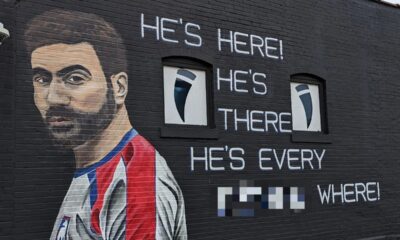
 News1 year ago
News1 year agoTed Lasso-inspired pop-up bar now open in St. Louis
-

 Board Bills1 year ago
Board Bills1 year ago2022-2023 Board Bill 165 — Jefferson Arms Community Improvement District
-
Board Bills1 year ago
2022-2023 Board Bill 183 — Amending Ordinance Number 62885 known as the Capital Improvements Sales Tax
-
Board Bills1 year ago
2022-2023 Board Bill 180 — Right to Counsel for Tenants Facing Eviction





